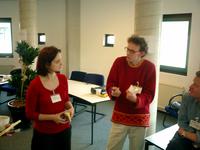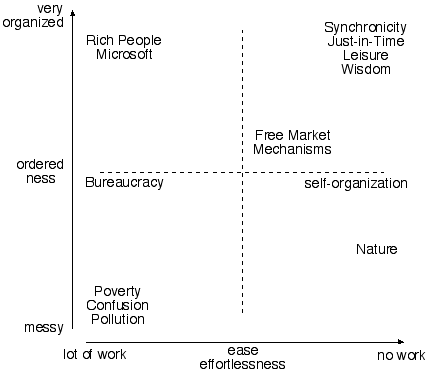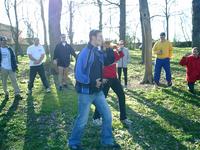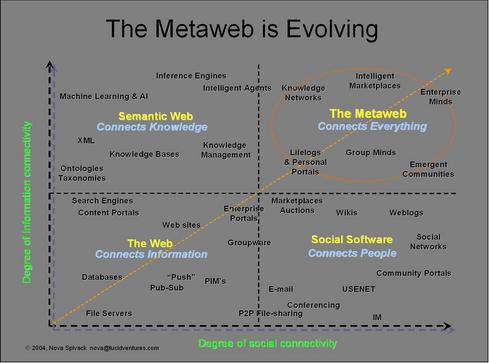|
This is my dynamic, frequently updated homepage. This is a NewsLog, also known as a WebLog or Blog.
Everything is evolving, so don't assume too much.
People to watch:
Adina Levin
Andrius Kulikauskas
Britt Blaser
Catherine Austin Fitts
Chris Corrigan
Clay Shirky
Dan Gillmor
Dave Pollard
David Allen
David Weinberger
Dewayne Mikkelson
Dina Mehta
Doc Searls
Elisabet Sahtouris
Elizabeth Lawley
Euan Semple
Florian Brody
Frank Patrick
Gen Kenai
George Dafermos
George Por
Graham Hancock
Greg Elin
Hazel Henderson
Heiner Benking
Inspector Lohman
Jean Houston
Jerry Michalski
Jim McGee
Jim Moore
John Abbe
John Perry Barlow
John Robb
Joi Ito
Jon Husband
Jon Lebkowsky
Jon Udell
Jonathan Peterson
Judith Meskill
Julian Elvé
Julie Solheim
Kevin Marks
Lawrence Lessig
Leif Smith
Letecia Layson
Lilia Efimova
Lisa Rein
Marc Canter
Mark Oeltjenbruns
Mark Pilgrim
Mark Woods
Martin Dugage
Martin Roell
Mary Forest
Matt Mower
Max Sandor
Michael Fagan
Mike Owens
Mikel Maron
Mitch Kapor
Mitch Ratcliffe
Nathalie dArbeloff
Netron
Noam Chomsky
Paul Hughes
Peter Kaminski
Phil Wolff
Philippe Beaudoin
Ray Ozzie
Raymond Powers
Rebecca Blood
Roger Eaton
Roland Tanglao
Ross Mayfield
Scott Lemon
Sebastian Fiedler
Sebastien Paquet
Skip Lancaster
Spike Hall
Steven Johnson
Stuart Henshall
Thomas Burg
Thomas Madsen-Mygdal
Thomas Nicholls
Timothy Wilken
Todd Suomela
Tom Atlee
Tom Munnecke
Tom Tomorrow
Ton Zijlstra
Lionel Bruel
Loic Le Meur
Nancy White
Mark Frazier
Merlin Silk
Robert Paterson
Colby Stuart
Nova Spivack
Dan Brickley
Ariane Kiss
Vanessa Miemis
Bernd Nurnberger
Sites to watch:
Edge
Junto
Absara
Rhizome
Nanodot
HeadMap
Openworld
FutureHi
Imaginify
Do No Harm
BoingBoing
Smart Mobs
Webcamorama
MetaFilter
NotThisBody
Disinfopedia
YES Magazine
Collective Web
WorldChanging
Disinformation
Escape Velocity
Space Collective
Friendly Favors
Emergent by Design
Independent Media
Global Ideas Bank
Forbidden Science
Greater Democracy
ThoughtsOnThinking
Disclosure Project
Explorers Foundation
Manufacturing Dissent
Collective Intelligence
Action without borders
Free Expression Network
Co-intelligence Institute
Electronic Frontier Foundation
French:
Emmanuelle
Manur
Elanceur
Loeil de Mouche
IokanaaN
Blog d'Or
Le Petit Calepin
GeeBlog
Absara
Guillaume Beuvelot
Ming Chau
Serge Levan
Jean Michel Billaut
C'est pas Mécanique

I live in Toulouse, France where the time now is:
01:06
Unique Readers:

Primarily
Public Domain
Everything I've written here is dedicated to the
Public Domain.

The quotes from other people's writings, and the pictures used might or might not be copyrighted, but are considered fair use. Thus, overall, this weblog could best be described as being:
Primarily Public Domain. |
Syndication:
 ![Validate my RSS feed [Valid RSS]](http://www.newciv.org/pic/valid-rss.png)
|
| Friday, March 26, 2004 |  |
|
|
|
 Noam Chomsky has a blog now, called "Turning the Tide". And, as always, he speaks hard-hitting words about things he knows well about. Here's one sample: Noam Chomsky has a blog now, called "Turning the Tide". And, as always, he speaks hard-hitting words about things he knows well about. Here's one sample:What can we do about it? Just about everything.
The IMF is hardly more than a branch of the Treasury Department. Economist Jagdish Bhagwati, no radical, refers to the IMF- Treasury-Wall St complex that is a core part of de facto world government. The Treasury Department is part of the US government. If we had anything remotely resembling a democratic culture, actions of the government would be under the control of citizens, which would mean that citizens have to at the very least know something about them. And beyond that, we would have mechanisms to engage in political action. And in a more democratic society the third component, Wall St., would not exist in anything remotely like its present form, and what would exist would be under popular democratic control.
But any of this requires constructing the basis for democratic participation, which has been very badly eroded in the US, creating what's often called a "democratic deficit" when we refer to others -- in our own case, a huge democratic deficit.
People in the more civilized sectors of the world (what we call "the third world," or the "developing countries") often burst out laughing when they witness an election in which the choices are two men from very wealthy families with plenty of clout in the very narrow political system, who went to the same elite university and even joined the same secret society to be socialized into the manners and attitudes of the rulers, and who are able to participate in the election because they have massive funding from highly concentrated sectors of unaccountable power that cast over society the shadow called "politics," as John Dewey put it.
But it's up to us whether we want to tolerate this, and if we could begin to approach the level of democracy of, say, Brazil, we could do quite a lot about IMF conditionalities. And it doesn't happen by just showing up once every four years to participate in an "election".
[ Politics | 2004-03-26 10:31 | | PermaLink ] More >
|
|
|
|
 According to New Scientist, a Southern California engineer, Behrokh Khoshnevis, has been working on a robot that can "print" houses. There are devices that are quite a bit like inkjet printers, but which output 3D models in plastic by building them from the bottom up, layer by layer, by spraying out little globs of plastic. This would be the same kind of idea, but it would be a bigger machine, and it might use a kind of concrete. They haven't actually worked out the perfect material yet, and he's collaborating with a company in Germany to find it. However, ironically, it seems that adobe, a traditional mix of mud and straw, could be quite suitable for this process. Wouldn't that be something. According to New Scientist, a Southern California engineer, Behrokh Khoshnevis, has been working on a robot that can "print" houses. There are devices that are quite a bit like inkjet printers, but which output 3D models in plastic by building them from the bottom up, layer by layer, by spraying out little globs of plastic. This would be the same kind of idea, but it would be a bigger machine, and it might use a kind of concrete. They haven't actually worked out the perfect material yet, and he's collaborating with a company in Germany to find it. However, ironically, it seems that adobe, a traditional mix of mud and straw, could be quite suitable for this process. Wouldn't that be something.
The process is called "Contour Crafting". Other, more detailed, articles are here and here.
[ Technology | 2004-03-26 14:39 | | PermaLink ] More >
|
|
| Thursday, March 25, 2004 |  |
|
|
|
 This Saturday there's the first WTF event in London. "WTF" standing for "WTF's The Future?!" A social forum and open space for various grassroots projects, people and organizations. Wish I could be there, but the necessary energies aren't really there for me to travel every week. But I'll be there virtually, as they have IRC channels open and maybe even streaming video. This Saturday there's the first WTF event in London. "WTF" standing for "WTF's The Future?!" A social forum and open space for various grassroots projects, people and organizations. Wish I could be there, but the necessary energies aren't really there for me to travel every week. But I'll be there virtually, as they have IRC channels open and maybe even streaming video.
[ News | 2004-03-25 14:27 | 0 comments | PermaLink ]
|
|
|
|
 Lawrence Lessig has a new book "Free Culture: How Big Media Uses Technology and the Law to Lock Down Culture and Control Creativity". Which you can buy or download for free under a Creative Commons. If you didn't know, Lessig is a law professor who's one of the most outspoken opponents of the alarming escalation of centralized corporate control of media, as well as a proponent for more flexible ways of dealing with copyrights. Lawrence Lessig has a new book "Free Culture: How Big Media Uses Technology and the Law to Lock Down Culture and Control Creativity". Which you can buy or download for free under a Creative Commons. If you didn't know, Lessig is a law professor who's one of the most outspoken opponents of the alarming escalation of centralized corporate control of media, as well as a proponent for more flexible ways of dealing with copyrights.
[ Information | 2004-03-25 14:50 | | PermaLink ] More >
|
|
|
|
 Seb Paquet talks about an interview with Ken Jordan, one of the authors of the Augmented Social Network whitepaper. ASN is probably the smartest vision that exists so far for how online social networks ought to work. Here in Ken Jordan's words: Seb Paquet talks about an interview with Ken Jordan, one of the authors of the Augmented Social Network whitepaper. ASN is probably the smartest vision that exists so far for how online social networks ought to work. Here in Ken Jordan's words:"The ASN is a blue sky vision for the future of online community. It stakes out some conceptual territory, presenting a civil society vision of how the Internet could evolve — particularly addressing the issues of Identity and Trust (two packed terms that have a pretty specific meaning in this context). It provides a clear alternative to the dangerous direction the Internet may well be heading in — a corporate/government panopticon. But it’s not enough to stand against digital disempowerment and control; we need to stand for something. The ASN shows that by coordinating the writing of standards and protocols between several different, previously separate technical areas (persistent identity, interoperability between community infrastructures, matching technologies, and brokering) you could add a layer of functionality to the Internet that would be greatly in the public interest." ASN grew out of the PlanetWork conferences in the Bay area, so a few words about its history probably helps. Here's part of the intro by Geert Lovink, the interviewer:Planetwork was founded in 1998 by Erik Davis, Jim Fournier, Elizabeth Thompson and David Ulansey. It is a network in which activists mingle with technologists. It’s aim has been to connect issues of global ecology and information technology. Politically speaking Planetwork is a civil society initiative that strategically positions itself as part of Silicon Valley, while at the same time celebrating the Seattle protests against corporate dominance. A typical post-dotcom phenomena, one could say. They are not so much driven by selfish libertarian greed, as once propagated by Wired. Rather, they are an incarnation of the hippie values and ideas that once circulated in the Well. I know, in California such distinctions may seem problematic, but it is nonetheless important to stress that there is still, or again, a progressive agenda within the IT-sector. Lots of good stuff in the interview. Ken Jordan also comments on the current social networking sites, like Friendster and Orkut, as falling far
short of what the ASN would do.. Here's a Seb Paquet's summary and comments:Jordan enumerates shortcomings of current social networking systems such as Friendster:
1. They are non-interoperable walled gardens.
2. Profile info is thin, not nuanced; it isn’t context sensitive (the boss and mother problem).
3. The profile information is static, not effected by your actions elsewhere.
4. You have limited control over your own profile information (“It calls for a new class of services: identity brokers”; you also want a “digital bill of rights” that enables you to exert control over access.)
5. The sites are exclusive, invitation-only clubs. [Note: I believe this is the exception rather than the norm].
I can’t help but notice how close weblogs come to fitting the bill - apart from restricting you to a single context and making it difficult to control acess, everything is in there. (See Dina Mehta and Lilia Efimova on blogs as SNSes.) Anyway, ASN is very important. I hope a structure comes together for how some software could actually be written for it.
Btw, next Planetwork conference is June 5th and 6th.
[ Technology | 2004-03-25 16:00 | 0 comments | PermaLink ]
|
|
| Wednesday, March 24, 2004 |  |
|
|
|
 Paul Hughes has an excellent article on FutureHi, "Defending Psychic Experience", arguing for the fundamental validity of inner experience, and discussing the difficulty in providing "objective scientific proof" for the same. Which gives rise to the various kinds of heated discussions that can happen between people who address the subject from different angles. Paul Hughes has an excellent article on FutureHi, "Defending Psychic Experience", arguing for the fundamental validity of inner experience, and discussing the difficulty in providing "objective scientific proof" for the same. Which gives rise to the various kinds of heated discussions that can happen between people who address the subject from different angles.[S]ince objective reductionist science has served us so well, so unbelievable well, it's become an addiction we can't let go of when it fails. Rather than blame objectivity itself, we instead say that anything that cannot be objectively verified is false. Which is why it comes as no surprise that many leading thinkers in the fields of cognitive and neuro-science actually believe that the inner experience is an illusionary falsity that doesn't exist!
This is where most often any further dialog on the subject comes to a grinding screeching halt. Because now they are resting on dogma. And once dogma enters the picture, there is no way to have a reasonable disucssion going forward. The basic assumptions are so different (i.e those who say they have an inner experience, and those saying it is doesn't exist), that dialog going forward becomes almost impossible. The same as if you were to argue about if God exists or not with an fundamentalist Christian. For those of you who've tried, you will understand what I mean by this. Yeah, I've tried arguing with various kinds of fundamentalists, and also with materialist fundamentalists, so I understand very well what he means. This is what I wrote in a comment:It is kind of a weird situation: arguing with people who believe they don't really exist, but that they nevertheless are right. To me, practices such as science and reasoning have to be based on a firm foundation of what you irrefutably can know by personal observation. Just about the only thing I know for sure is that I exist and that I perceive and think. The rest is guesswork which always will build on those primary factors, but it might be very useful guesswork if you don't lose your way. If somebody else decides to instead start off with some abstract theory, and they end up concluding that I don't exist, then I'd say they've done a bad job of reasoning, largely by starting in some arbitrary place, with data that they can't prove. This argument is an important one to me. I must admit that I once in a while write a long article about it, and half the time I don't post it. Because in reality I don't have the argument in person very often. I.e. an argument with a Fundamentalist Materialist Skeptic about the validity of subjective experience, particularly as it pertains to "psychic" phenomena of any kind. And it seems sort of strange to have a heated argument with somebody who isn't there. So I usually decide against posting it.
Anyway, from another comment to Paul's article comes a link to an absolutely excellent paper by Neal Grossman, Dept. of Philosophy, Univ. of Illinois at Chicago: "On Materialism as Science Dogma". He makes the arguments better than any of us could hope to do. Long and very readable article. He chooses to use NDE (Near Death Experiences) as a reference point, but as he says, it could well be about UFOs or a bunch of other "weird" subjects that happen to be extremely well documented and scientifically verified, but still generally ridiculed by both materialist and religious fundamentalists, who still, maybe for a while longer, are the ones with the most say and the most power in academics, in government, and, somewhat, in the media.Fundamaterialism is so deeply ingrained in the academic establishment that most researchers on the NDE fall prey to it. For, after presenting case after case which would satisfy any reasonable standard of empirical evidence against materialism, even sympathetic researchers almost always deem it necessary to add the disclaimer that their research does not prove that there is life after death. But no scientific hypothesis is ever proven in this sense. Theorems in logic and mathematics can be proved. In science, hypotheses are not proved; rather, empirical evidence renders a given hypothesis more or less probable. There is no such thing as logical, or mathematical certainty in science. The fundamaterialists are correct in that the hypothesis that consciousness exists independently of the body cannot be proven with mathematical certainty. But neither can any other scientific hypothesis, because empirical science deals with evidence, not proof. Evidence never "proves" a hypothesis, it just makes it more probable. And, when evidence for a given hypothesis accumulates to a certain degree, we accept the hypothesis as true. But "true" in this scientific sense never means "proven"; it means very very probable. In science there is always the possibility that a given hypothesis may turn out to be false. The fundamaterialist will not accept the hypothesis of an afterlife until it is "proven" beyond a logical possibility of being false. That is, he is using a concept of proof which belongs in logic and mathematics, not in science. And NDE researchers are playing the fundamaterialist's game when they utter caveats that their research does not prove the hypothesis of an afterlife. What researches should say, in my opinion, is simply that they have amassed sufficient evidence to render the hypothesis of an afterlife very probable, and the hypothesis of materialism very improbable.
In the above paragraphs, I have been using the terms "science" and "scientific" in its epistemological sense. Science is a methodological process of discovering truths about reality. Insofar as science is an objective process of discovery, it is, and must be, metaphysically neutral. Insofar as science is not metaphysically neutral, but instead weds itself to a particular metaphysical theory, such as materialism, it cannot be an objective process for discovery. There is much confusion on this point, because many people equate science with materialist metaphysics, and phenomena which fall outside the scope of such metaphysics, and hence cannot be explained in physical terms, are called "unscientific". This is a most unfortunate usage of the term. For if souls and spirits are in fact a part of reality, and science is conceived epistemologically as a systematic investigation of reality, then there is no reason why science cannot devise appropriate methods to investigate souls and spirits. But if science is defined in terms of materialist metaphysics, then, if souls and spirits are real, science, thus defined, will not be able to deal with them. But this would be, not because souls and spirits are unreal, but rather because this definition of science (in terms of materialist metaphysics) has semantically excluded nonphysical realities from it scope. So, obviously it is hard to discuss a subject matter with somebody who has the fundamental, unshakable belief that it doesn't exist at all and that it is impossible. Like my comment above about the difficulty of discussing existence and inner experience with a person who believes that they don't really exist.
I believe it will all turn around, and before very long. And that will change our lives and our societies immensely. We might indeed find that we can very well understand a large chunk of life, the universe and everything - material as well as non-material - inner as well as outer, and we can understand all of that in a rather unified and very rational way. And we might realize that we had been lead astray from time to time by high priests who made us believe they had a direct line in with universal truth, when really they were just listening to their own voices in their own heads. Which will all be quite forgivable at that time. It is a noble and formidable goal to try to understand how existence works, and not hard to get stuck in a blind alley along the way.
[ Science | 2004-03-24 01:05 | | PermaLink ] More >
|
|
| Tuesday, March 23, 2004 |  |
|
|
|
Brief article in Salon.com (requires looking at an annoying commercial to read it) about some software luminaries' ideas about what programming is about, and how it can be done better. Hardware seems to keep following Moore's Law: it gets twice as fast, or half as expensive, every 18 months or so. But software does at best improve linearly. So most of the increased potential in hardware is wasted by messy and inefficient programming. The software is the bottleneck.
Programming is still mostly an art, not a science. I guess that's part of what I like about it. You pretty much have free hands to implement a requirement any way you feel like, as long as it ends up working. But it also means it is extremely hard to manage the complexity and to make good predictions about how long a certain task will take. And most solutions are extremely wasteful and often sloppy.[Charles] Simonyi believes the answer is to unshackle the design of software from the details of implementation in code. "There are two meanings to software design," he explained on Tuesday. "One is, designing the artifact we're trying to implement. The other is the sheer software engineering to make that artifact come into being. I believe these are two separate roles -- the subject matter expert and the software engineer."
Giving the former group tools to shape software will transform the landscape, according to Simonyi. Otherwise, you're stuck in the unsatisfactory present, where the people who know the most about what the software is supposed to accomplish can't directly shape the software itself: All they can do is "make a humble request to the programmer." Simonyi left Microsoft in 2002 to start a new company, Intentional Software, aimed at turning this vision into something concrete. Well, it can certainly make sense to separate the two - defining the solution and actually implementing it. Although not very well when we're talking systems analysts who decide what to do and programmers who do it. But maybe if the second part could be more or less automatic and directly driven by the representation of the design.
But everybody doesn't agree that it just takes a better way of writing the software. Rather a fundamental re-thinking of many things. But even in the energetic open-source scene, where people really are free to do whatever they'd actually want, we aren't particularly seeing fundamental changes in how things are done."There's this wonderful outpouring of creativity in the open-source world," [Jaron] Lanier said. "So what do they make -- another version of Unix?"
Jef Raskin jumped in. "And what do they put on top of it? Another Windows!"
"What are they thinking?" Lanier continued. "Why is the idealism just about how the code is shared -- what about idealism about the code itself?" Yeah, how about a more fundamental revolution? Why am I stuck with a desktop metaphor on my screen, when my own desktop already had too few dimensions to it. We could do so much more with computers. But it is not easy to invent something totally different. I haven't, even though I'd love to. Those smart folks in the article have invented amazing new things in their time, but even they know it doesn't really add up to much compared to what is possible. We're limited by a tendency to define the next thing based on what we already know. That can even be a rather viable business strategy, as this funny quote from Bill Gates years ago illustrates:"The best way to prepare is to write programs, and to study great programs that other people have written. In my case, I went to the garbage cans at the Computer Science Center and I fished out listings of their operating systems."Yeah, and it still shows, Bill. Imagine he instead had invented something fundamentally new.
[ Programming | 2004-03-23 06:08 | | PermaLink ] More >
|
|
|
|
 One of the projects of the Long Now Foundation is The Rosetta Project: One of the projects of the Long Now Foundation is The Rosetta Project:The Rosetta Project is a global collaboration of language specialists and native speakers working to develop a contemporary counterpart of the historic Rosetta Stone. In this updated iteration, our goal is a meaningful survey and near permanent archive of 1,000 languages. Our intention is to create a unique platform for comparative linguistic research and education as well as a functional linguistic tool that might help in the recovery or revitalization of lost languages in unknown futures.
We are creating this broad language archive through an open contribution, open review process and we invite you to participate. The resulting archive will be publicly available in three different media: a micro-etched nickel disk with 2,000 year life expectancy; a single-volume monumental reference book; and through this growing online archive. See, it is a bit of a problem to plan how you can leave a legacy of knowledge for future generations that actually lasts long enough for them to be able to access it, and that will be meaningful to them. A CD-ROM has a shelf-life of maybe 10 years. Most binary encoding formats would be pretty useless in a couple of hundred years, as they're just a bunch of zeros and ones, and unless somebody remembers what the encoding scheme was, it is no easy task to play them back. Their answer is to actually engrave regular letters into disks that will last a long time, and to include the text in multiple languages, just like the actual Rosetta Stone, which allows the decryption of Egyptian hieroglyphs, because a text was given simultaneously in hieroglyphs, Demotic writing, and Greek.
[ Knowledge | 2004-03-23 16:20 | | PermaLink ] More >
|
|
|
|

Via Creative Generalist, check out Freecycle. Don't just throw unneeded stuff away and buy new. Put it up to be picked up for free by people in your local area. And you can be at the receiving end too, of course.One rule: everything posted must be free. Whether it's a chair, a fax machine, piano, or an old door to be given away, it can be posted on the network. Or, maybe you're looking to acquire something yourself? Respond to the posting directly and you just might get it. After that it is up to the giver to set up a pickup time for passing on the treasure. Seems to happen successfully in several hundred cities. And simply through e-mails in yahoo groups.
[ News | 2004-03-23 16:53 | | PermaLink ] More >
|
|
| Friday, March 19, 2004 |  |
|
|
|
 So, I spent the day at BlogWalk 1.0 here in Enschede, The Netherlands. We didn't really walk and we didn't particular blog much along the way either. But we met at the Telematica Institute and did Open Space and various kinds of group discussions, also over several meals. Just 17 people or so, which gave a good opportunity for staying relatively focused and getting to know each other. Subject mainly being weblogs in knowledge management contexts, but also weblogs in general. So, looking at what functions weblogs might play in institutions and enterprises, and what might be the obstacles to make it happen, or the steps and positioning that might make it work. Obviously the people who are in charge in many organizations have no clue what weblogs are, or, if they do, might have a lot of fears and concerns about how dangerous it would be if people would actually rather freely talk publically about what they do, and even mix it in with their personal life and other interests. What if they reveal company secrets, or make the organization look bad, and that kind of thing. There are problems like that, of defining the lines between private and public, what should be shared and what not, but mostly it is just that people don't understand how it works, and don't realize that it could be a powerful tool for information sharing and relationship building. And in many cases as effective a knowledge management tool as anything else that is out there. There are fancy KM systems that often are not that easy to use, or that stuff can get lost in easily. Whereas a weblog is rather easy, and you don't have to worry very much about where exactly a certain item fits, and you can usually find old items very easily when you need them. And weblogs build up relationships and one's relations help filter information, and various self-organizing things go on that are useful. But is hard to explain the blogosphere to somebody who's totally not tuned into that kind of things, and haven't tried it, and particularly to managers who're afraid of losing control. And, despite that most of the hardcore bloggers can see quite well how it can be beneficial for various kinds of organizations, there seems to be a scarcity of good studies or success stories to show as evidence. Which is important both for the academics studying the phenomenon, and for anybody who tries to introduce a tool like weblogging into an organization. So, I spent the day at BlogWalk 1.0 here in Enschede, The Netherlands. We didn't really walk and we didn't particular blog much along the way either. But we met at the Telematica Institute and did Open Space and various kinds of group discussions, also over several meals. Just 17 people or so, which gave a good opportunity for staying relatively focused and getting to know each other. Subject mainly being weblogs in knowledge management contexts, but also weblogs in general. So, looking at what functions weblogs might play in institutions and enterprises, and what might be the obstacles to make it happen, or the steps and positioning that might make it work. Obviously the people who are in charge in many organizations have no clue what weblogs are, or, if they do, might have a lot of fears and concerns about how dangerous it would be if people would actually rather freely talk publically about what they do, and even mix it in with their personal life and other interests. What if they reveal company secrets, or make the organization look bad, and that kind of thing. There are problems like that, of defining the lines between private and public, what should be shared and what not, but mostly it is just that people don't understand how it works, and don't realize that it could be a powerful tool for information sharing and relationship building. And in many cases as effective a knowledge management tool as anything else that is out there. There are fancy KM systems that often are not that easy to use, or that stuff can get lost in easily. Whereas a weblog is rather easy, and you don't have to worry very much about where exactly a certain item fits, and you can usually find old items very easily when you need them. And weblogs build up relationships and one's relations help filter information, and various self-organizing things go on that are useful. But is hard to explain the blogosphere to somebody who's totally not tuned into that kind of things, and haven't tried it, and particularly to managers who're afraid of losing control. And, despite that most of the hardcore bloggers can see quite well how it can be beneficial for various kinds of organizations, there seems to be a scarcity of good studies or success stories to show as evidence. Which is important both for the academics studying the phenomenon, and for anybody who tries to introduce a tool like weblogging into an organization.
Anyway, a very enjoyable event with great people. You can find some comments from some of the other guys at TopicExchange.
These BlogWalk events are loosely related to and lead up to the next BlogTalk, which is a bigger event held in Vienna, next July 5-6. And I should be making it there this year.
[ Diary | 2004-03-19 17:40 | | PermaLink ] More >
|
|
| Thursday, March 18, 2004 |  |
|
|
|
So, I'm on my way to BlogWalk, a small, informal gathering in Enschede in Holland. Mostly Knowledge Management professionals and academics. A couple of good friends of mine among them, who hopefully succeed in showing up. And some interesting new people to meet and converse with. It is not entirely clear what I'm doing there, but no reason to let that stop me. The focus of the conversation is "weblogs in a knowledge management context", which I can certainly hook into.
[ Diary | 2004-03-18 00:01 | 0 comments | PermaLink ]
|
|
| Wednesday, March 17, 2004 |  |
|
|
|
Slashdot has a thing on functional programming languages. Which I didn't really know much about. But functional programming might best be compared with how a spreadsheet works, or how the SQL database query language is working. I.e. you specify the structure of the result you want, rather than having to figure out step-by-step how it would come about.
I'm a programmer, and despite useful advances such as Object Oriented Programming, my job would mostly consist of coming up with steps for solving problems. There are big complex problems I'd kind of love to solve, but which I can't, because I haven't figured out the steps that would solve them. So, it is refreshing with different ways of thinking about stuff like that. Where you rather work on specifying the results you'd like to get, and a compiler or interpreter will optimize the best way of getting there. Bugs don't have quite the same meaning when you work that way. You might not get the answer you're looking for in the first shot, but it is not a matter of the whole thing crashing, which is how normal programming is. You adjust your formulas untill you get the type of results you hoped for, rather than spending most of the effort getting your steps to work at all.
Now, how about that for solving big complex problems involving many people. I'm mainly thinking about information sharing in social networks. I hold certain kinds of information and certain skills and I have certain interests. I could use certain things from other people, either generally, or in specific situations, or to solve problems that suddenly come up. Maybe I need an accountant who knows about tax issues and company formation differences between the U.S., France and England. Maybe I need the side window for a 1959 Cadillac Seville. Some things already fit into solutions that people have made. Like eBay would fit for the latter. But what if nobody has spent the resources for piecing together a specific solution. Or if I don't know where it is.
So, the thought is that I might possibly express my needs in a functional way. Well, we're talking about those things that might be put into some kind of reasonably precise expression. I'm looking for this thing, and I'll be willing to pay that much, and I want it by this time, and from somebody within this radius from my house. And that some super parallel distributed interpreter comes along and grabs my query, together with everybody else's, and optimizes them all, so as to use the least possible resources in order to get everybody approximately what they want, if it is available.
Oh, there are lots of problems in that, of course. It is merely an idea. It is not clear how one would express complex requests into an unambiguous query. And I'm not sure anybody would know how to write such an interpreter. But it reframes the problem. One task is to be able to express clearly the types of things people want, and which we expect that computers might facilitate. And the other task is to write the engine that processes all those queries and gives the best possible results. And each of those separate areas would of course be improved as people find better and better ways of doing it.
[ Knowledge | 2004-03-17 04:02 | | PermaLink ] More >
|
|
|
|
 When I was a kid I was very interested in the future. One thing that was pretty obvious, other than flying cars and space stations, would be that by now we'd really not have to work, per se. It was sort of self-evident, even when I was ten. Of course, if we keep being able to do things better and better, more and more efficiently, more and more bang for the buck, more and more automation - then there would be less and less of an actual need for work. It is a simple calculation. The stuff we need could be produced by a smaller and smaller percentage of the population. Which would allow us to spend our time being creative and having a good time. When I was a kid I was very interested in the future. One thing that was pretty obvious, other than flying cars and space stations, would be that by now we'd really not have to work, per se. It was sort of self-evident, even when I was ten. Of course, if we keep being able to do things better and better, more and more efficiently, more and more bang for the buck, more and more automation - then there would be less and less of an actual need for work. It is a simple calculation. The stuff we need could be produced by a smaller and smaller percentage of the population. Which would allow us to spend our time being creative and having a good time.
The reason that didn't happen might be in the same category as why a brand new 3GHz PC isn't any faster than a 4.77MHz IBM PC from 20 years ago. In principle it should be a thousand times faster, and it is, technically speaking. But it doesn't do anything more. It takes longer to start up Word on it than to start WordStar on that ancient relic. And there are many more things that can go wrong, and more one needs to learn in order to use it.
Maybe the reason is in the same category as why my household budget looks about the same, no matter how much or how little I make. There's not quite enough for what I need, and I tend to pay things late. If somebody came along and gave me $10,000 extra per month, I would at first feel rich, and pay all my bills, and put some aside. But gradually I would come to think I needed a bigger version of everything, and I'd invest in some things I wouldn't otherwise have. And pretty soon I would have used it up, and have more regular expenses, and I'd again be a little behind. While still living essentially the same way. You know, in a house, eating food, driving vehicles, wearing clothes, breathing air.
You can probably draw a nice systems diagram of how there are several self-reinforcing loops involved in these scenarios. If there's capacity to make more stuff or do more things, they will be done, and they will create new needs and new ideas about new things that need to be done. The PC of today would indeed run WordStar like lightning, but I'd be missing the graphics, and would quickly look around for other things it ought to do. Voids will be filled. And there's the influence from all the other folks who have some new gadget or feature. If my neighbor has 3D displays on his walls, I'll feel a little left out, even if I was doing great with a monochrome screen at some other point in time.
So, what would it take for progress to actually add up to progress, rather than to staying in the same spot with some slightly different gear?
I think the main limiting factor is not the envy of my neighbor's stuff, but the economics of production. It doesn't have to be that way, but with the way business is currently structured economically, it is quite natural. Economic rewards flow to those who keep the wheels churning, rather than necessarily to those who solve the biggest problems in the most efficient way. There's no economic incentive to constructing the machinery that would give everybody in the world food to eat every day, without them having to work. Even though it would be fairly easy and comparatively cheap to do. But it wouldn't turn a profit. People who aren't working don't make money to buy stuff, so they aren't good consumers. People who aren't working is a problem in the current scheme of things. Something that requires the financing of unemployement payments, which requires that the wheels are churning faster somewhere else, creating profits that can be diverted for that purpose. It is all pretty insane of course.
If you can formulate an economic scheme that clearly measures the actual costs of various approaches, and the value people perceive in them, and which which allows easy financing of the permanent solving of big problems, and gives little value to wasteful and unnecessary work - then it can all change rather quickly. No, I'm not talking about communism. Rather about a free market with a good enough flow of high quality of information, using a different kind of currency. A currency that is built on quality of life, and which doesn't have a built-in accelerating corrosion that encourages fake productivity for its own sake. Rather, a system the encourages the optimization and maximization of free time and creativity.
It is not too late. The future is yet to come.
[ Culture | 2004-03-17 05:55 | | PermaLink ] More >
|
|
|
|
 BlackBeltJones writes: BlackBeltJones writes:From an amazing story about a woman who moved to a small island off the coast of Finland:"I had to build a new jetty. I modelled it after others that I had seen. I cut down trees from the forest, and built a chest - a wooden frame - at the end of the jetty, which I filled with stones", she says on the shore. "It isn't hard to build a jetty. All you need is a chain saw and a brain." Which got me to thinking, what would I be able to reverse-engineer in my mind from memory? Anything? I'm going to try and give myself a quiz, and ask Foe to name 3 things which I then have to sketch the workings of from memory, and perhaps then how I would go about constructing them.
The island-living lady in the story works as a translator over the internet, but it's not clear as to how much she relies on the net as a source of knowledge to be able to live alone in such a remote place.
I've thought before about the web, moblogs and stolen knowledge - collecting your memories of things, proceedures, recipes, constructions through your phone might result in not just a lifeblog, but a life-or-deathblog. Of course, in such situations, it might just be easier to use your mobile phone to give Ray Mears a call...
» Helsinki Sanomat: Living alone on a small island in the Turku archipelago The story of that lady is quite a trip. She doesn't seem worried at all about living alone in a just about arctic winter, far away from anybody. But she makes her living on the net.
Anyway, I also have a fascination with knowledge of self-sufficiency, survival and sustainable living. Not that I'm really doing anything about it, but I'm somehow very attracted to gather do-it-yourself knowledge. Knowing how to get by in the wilderness, how to read the signs of nature, how to know what plants are edible, knowing how to make a house out of whatever is around. Or, preferably a bit better than that. Knowing how to re-create civilization if necessary. How to find and melt metals, how to drill a well, build a radio, or whatever. These things are ironically almost lost knowledge in our society. Meaning that it is so specialized knowledge that only few people have it. Oh, I can order a book from Amazon overnight which will tell me most of what I need to know. But what if civilization falls apart and I didn't get around to ordering that book first. Or I'm stranded on a desert island without it. What do I do? It is inspiring when people have the kind of comprehensive and practical knowledge that makes them know what to do, even when most "civilized" people have no clue.
[ Inspiration | 2004-03-17 13:14 | | PermaLink ] More >
|
|
|
|
 Julie posted this picture the other day. So, it is at the end of a day. I can see the lights have just been turned on in Toulouse. They've been on in Copenhagen for a bit longer. And I can see there are a lot of people using lights in Holland, where I'm going tomorrow. Would be nice to have this kind of thing live. Except, of course, that it wouldn't really look like that, because of the clouds. Julie posted this picture the other day. So, it is at the end of a day. I can see the lights have just been turned on in Toulouse. They've been on in Copenhagen for a bit longer. And I can see there are a lot of people using lights in Holland, where I'm going tomorrow. Would be nice to have this kind of thing live. Except, of course, that it wouldn't really look like that, because of the clouds.
[ Inspiration | 2004-03-17 14:05 | 0 comments | PermaLink ]
|
|
| Tuesday, March 16, 2004 |  |
|
|
|
From Chris Corrigan, key ideas from a paper How stories affect human action in organisation:
- Organizations are not "things" but rather relational processes.
- Human beings use story to represent and understand the patterns of experience.
- Stories only represent partial versions of reality and so narrative interpretation is subject to power dynamics.
- Powerful storyteller can make people "captives" in the story; this is the process of mythmaking.
- "Organisations, in fact the 'organising via relating, exist in order to 'do something'. Hence somehow, the individuals in the organisation need to 'act'...if our identity is clear and we are actively interconnected in interdependent processes that when information comes available, action can emerge. The information sharing happens in interactive processes between individuals (either inside or outside the 'organisation')."
- "In the language of Gover (1996) 'our identities are being constitutes and reconstituted with their physical, cultural and historical contexts'. The roots of narratives and identity, he claims, 'merge, inextricably embedded and nurtured in the soil of human action'."
- Narratives that resonate with an individual's experience create meaningful and sustained emergent action.
- If people in organisations don't pay attention to the Individual Intention, the likelihood of the vortices of the narratives in those organisation resonating with the vortex of the Individual Intention is purely one of chance. It is due to individuals themselves to actively spend the time to understand other people’s Individual Intention.
- By consciously working on understanding Individual Intention and consciously work on fuzzifying the narrative the complex responsive process of interaction between the people will move to the attractor at the critical point. This can only happen in self-organised process of interactions where meaning can start to flow.
Important stuff about the deep connection between narrative and action. The story or myth about what is going on can sometimes integrate things and inspire action in a way that goes beyond what we easily can express consciously.
[ Organization | 2004-03-16 16:13 | 0 comments | PermaLink ]
|
|
|
|
These are just some lose thoughts while I'm thinking aloud.
One can learn a good deal just by plotting various kinds of qualities on different axes in a coordinate system and noticing what seems to end up in the different quadrants.
Now, one of the things I'm interested in is how to get myself and others the most useful information I need in the easiest and fastest way possible. That sounds kind of tame in itself, so let me skip ahead a little bit.
What I really would want is that I'm presented with exactly the most useful information I need at any given time, without any work on my part. Doesn't have to relate to computers particularly - I'd like that in life.
If I suddenly need a plumber, it would be nice if the first person who walked by my house, say within the next minute or so, would happen to be a plumber who could use some work. And, incidentally, he happened to be the most skilled and reliable guy, and cheap too.
OK, it wouldn't be much more trouble if I had to make a phone call and he showed up. But the trouble is the information. I need to know who the best person is, who has optimum pricing, who can be here quick. Maybe I already know the answer and it would be great. Maybe I know who to call quickly, and they would know the answer. All of that would work. But the yellow pages involves too much chance.
And that's a simple and routine problem. It is harder if I want to find somebody to go into business with, or I needed the answer to a unique and maybe complex question.
I might know the answer already. I might be good at guessing it. Or I might know people who're likely to know, and I can reach them quickly. Or I have the right book to look up in. Or I go and search in a search engine. Google has made me much smarter already. I can answer a lot of questions within a minute, simply by guessing at a couple of search words. But, again, if my need or my question is more complex and unique, it will not give me anything.
Nevertheless, I want ALL of it to be ordered suitably, just for me. All information in the world that I might possibly need. I don't necessarily care HOW it happens. Although, I do care if I need to help making it happen in some way. But at first I just care about the effect I want.
There's, for example, how ordered my information is...

OK, words can be used in various ways, and of course everything is ordered somehow. But I'm talking about what I might need. If I go into a library, the best kind of order would be that the two books I need happened to be standing right by the entrance, easy for me to see. A friendly sign saying "Flemming! Here are the books you're search for!" would help too. See, if doesn't at that point matter to me that the whole library uses the Dewey decimal system and alphabetical sorting. What matters is that I find what I want quickly. Or slowly if somehow I enjoyed that more. Anyway, we're talking about a somewhat subjective quality of orderedness. But we're talking about how to accommodate our subjective idea of what order something should be in, by some system in the real world, which probably is computerized. And it needs to do it even if I don't really know exactly what my preferred order is. I want it to be in the right order without me having to spend any significant time in finding out what that might be. Of course, if I do know, and I suddenly have a preferred order I can state, like "Give me all the books sorted by the colors of their backs", I'd want that too.
Actually, besides how ordered things are, we get into the issue of how much work it is to make it so. I could sort all of the books in the library in color order, if I took a few weeks and they didn't kick me out. Or some other mechanism might do it for me. Anyway, there's naturally a scale of...

which leaves out various dimensions, like who or what does the work, and does it need to be done in advance, or is it done at the time the need arises.
I suppose it is not a problem if something requires a lot of work, if either it has been convenient for somebody else to already do it before I need it, or some parallel supercomputer has put it together, and can present the results to me easily. But I prefer doing as little as possible. And I suppose we can say that it is generally better if things happen with ease and minimial trouble, as opposed to with great time and effort. And how that adds up is maybe more clear if I put it together in two dimensions like this:

OK, I'm really just brainstorming here. Nothing scientific about it, and we can argue about how to use the words and where various things will fit.
But you'll notice for example that some activities and some people involve a lot of effort for little result. It is sometimes how it is to be poor or having bad infrastructure. Walking 10 miles for a pot of water. Or how poor people in an otherwise rich society might do stupid things and waste the resources they have. Or how people just trying to survive in developing countries might make an ecological mess.
Then there's the situation that you apply massive power and resources for a rather small purpose, and it therefore can be extremely well organized and ordered. Say you're a billionaire and you insist on getting fried hummingbirds freshly caught in Madagascar on your dinner plate every evening. You might command a jet to fly them to you every morning, and employ a whole hierarchy of people to make it happen in the most precise manner possibly. Or, say you're Microsoft, and you make software. Instead of making better and more inherently elegant software, you might instead hire 1000 more highly qualified engineers to try to close the holes in what you have. In other words, if you have great wealth or power, you can afford doing something in an inefficient but very organized way. If you are very wealthy and you want some kind of information, you can have a whole team of the most highly qualified and highly paid experts sitting around trying to get it for you.
In the lower right, I put "Nature", which one could well argue about. Nature is ordered, but not in the way we normally call ordered or organized. It is in many ways a mess, but a mess where nothing is ultimately wasted, and where there are lots of synergies between different lifeforms and elements. Lots of work is being done, but not really in the sense of what we normally call work. Each living creature is pretty much just going about its business and doing what comes natural, and apparently not losing any sleep over how things are "supposed to be done". If some suitable food walks by, you'll eat it, and if something comes by that considers you food, they'll eat you. The waste products are just left behind randomly. But somehow it all works rather beautifully, and something else will probably consider those waste products its own lunch. If you examine, for example, ants, they just walk around and follow very simple rules for what to do. There's a lot of redundancy, and eventually things get done, haphazardly, but quite well. It is done in a messy way, but without anybody having to make plans or work hard on making them turn out. Thus, great ease, but low organization.
Although we humans can learn a lot from the rest of nature, and strategies like what ants are using to find food might well be useful for our own algorithms to automate, those approaches aren't how we ourselves would like to work. We'd like to work at a higher order. I'm not satisfied with having to wander around haphazardly if I already know what I want and where I'm going. I wouldn't at all be nonchalant about being eaten on the way there. No, we humans usually want something fairly complex, but focused, and we want to be quite sure to get it, but most of us don't have a lot of time and resources to put into it.
So I want something very ordered that takes next to no work to acquire. We're back to talking about information. Ideally I want something just-in-time, exactly when I need it, without having to wring my brain trying to plan everything in advance, and without having to start a big project whenever I want something.
When we're talking about information, there are various noble approaches that are aiming at giving me ordered and useful information easily. There's the Semantic Web, which tries to mark everything with added attributes so that we can ask more meaningful questions. Instead of just storing text, somebody notes down which parts are an "address", a "person", a "place" and that kind of thing. Which adds some intelligence. And the hope is that people will actually feel like recording this kind of information somehow. Another philosophy is that this isn't going to happen, but we need better search engine technology that itself guesses at what things mean, based on our behavior when we move around on the web, so that it might better give us what we might need. Maybe it will be combinations. Social networks, or networks of economic activity, might gather information, by both the behavior and the deliberate value choices of many individuals. And it might add up to better information, and a better way of giving me the information I might want.
As a user, I don't necessarily care how it happens. I want an experience where things appear either like synchronicity, where an apparently random item I get presented with happens to be exactly what I need; or simply as the answer to a question I pose. But I expect that this can happen in some kind of sustainable way, just like how google comfortably can provide everybody's searches without incurring any impossible costs.
I suppose some kind of free market, self-organizing, collaborative filtering is part of what will get there. Plus somebody's clever inventions that aren't there yet.
[ Knowledge | 2004-03-16 16:15 | | PermaLink ] More >
|
|
| Monday, March 15, 2004 |  |
|
|
|
 Yesterday Birgit and I were the "hares" in a Hash House Harriers run. You know, HHH is this drinking/walking/running/socializing club, with chapters almost everywhere in the world, particularly where you find english-speaking expats. The job of the hares is to lay a track, primarily using flour, which everybody else then can (barely) follow, while they run or walk. It could be done live, but that would be a bit tricky unless one knows the area really well. So we found that it took a surprising amount of preparation to scout out an area, and a trail that is interesting and that ends up where it started without repeating itself. So, we started with a nearby park, and managed to find a surprising number of somewhat hidden paths to lead people around on, along ditches, railways, climbing over some minor fences and that kind of thing. Worked out quite well, it seems. We got away with just a couple of "down-downs" in the obligatory after-run ritual. A down-down is the punishment of having to drink out a glass of beer while a certain silly song is being sung. And the hares will traditionally be under close scrutiny, and likely to be called on the spot for anything they might have done right or wrong (doesn't really matter which). Yesterday Birgit and I were the "hares" in a Hash House Harriers run. You know, HHH is this drinking/walking/running/socializing club, with chapters almost everywhere in the world, particularly where you find english-speaking expats. The job of the hares is to lay a track, primarily using flour, which everybody else then can (barely) follow, while they run or walk. It could be done live, but that would be a bit tricky unless one knows the area really well. So we found that it took a surprising amount of preparation to scout out an area, and a trail that is interesting and that ends up where it started without repeating itself. So, we started with a nearby park, and managed to find a surprising number of somewhat hidden paths to lead people around on, along ditches, railways, climbing over some minor fences and that kind of thing. Worked out quite well, it seems. We got away with just a couple of "down-downs" in the obligatory after-run ritual. A down-down is the punishment of having to drink out a glass of beer while a certain silly song is being sung. And the hares will traditionally be under close scrutiny, and likely to be called on the spot for anything they might have done right or wrong (doesn't really matter which).
[ Diary | 2004-03-15 06:19 | 0 comments | PermaLink ]
|
|
|
|
 From Synergic Earth News: From Synergic Earth News:Pop star George Michael is abandoning the music business to release his songs online for free instead. The multi-millionaire singer said he will never make another album for sale in record shops because he does not need the cash and does not enjoy fame. Fans will be given the option to make donations online in exchange for downloading the tracks, and the proceeds will be given to charity. He is promoting his latest album, Patience, which he said is his last. The 40-year-old star made his announcement during an interview with Jo Whiley on BBC Radio 1. Speaking about his decision, he said: "I'm sure it's unprecedented, it's definitely unprecedented for someone who still sells records. "I've been very well remunerated for my talents over the years so I really don't need the public's money." He added that he hoped people downloading his music would donate to his favourite charities. Explaining his decision, the former Wham! frontman said: "It does two things - it takes the pressure off to have a collection of songs every so many years, which is what nearly killed me. "I'm not pretending I won't be famous any more, but in the modern world if you take yourself out of the financial aspect of things, you're not making anybody any money, you're not losing anybody any money. Believe me, I'll be of very little interest to the press in a certain number of years. I'll hopefully be a happier man, giving my music and also doing something really positive with my music if people are generous enough to donate to the site. I'll remove myself from all that negativity." Bravo. Great idea. Now, if I only liked his music. But does that mean it will be open source and/or public domain? His site crashed Mozilla for me, so I didn't get around to finding out. Such an act of gift giving would work best, of course, if anybody, on their own initiative, could decide to make a compilation of his music and distribute it in whichever way they found appropriate.
[ Information | 2004-03-15 08:54 | | PermaLink ] More >
|
|
|
|
Nova Spivack via Dina and Jon:

Good. Always helps with some diagrams. So, we want the MetaWeb, of course. Everything connected. Now we just need somebody to implement it.
[ Knowledge | 2004-03-15 09:03 | | PermaLink ] More >
|
|
| Saturday, March 13, 2004 |  |
|
|
|
 A nice little snapshot slideshow at BBC News about Zvi Bentwich, a well-known and respected Israeli immunologist who now spends his weekends in the West Bank and Gaza doing humanitarian medical work. A nice little snapshot slideshow at BBC News about Zvi Bentwich, a well-known and respected Israeli immunologist who now spends his weekends in the West Bank and Gaza doing humanitarian medical work."Among Palestinians I have worked with or treated, I have never experienced any kind of hostility – not in a look or a word. I am appreciated by them in the same way that I am appreciated by my Israeli patients. This is the reward of this work." I'm glad there are always good people doing good things, despite any odds against them.
[ Inspiration | 2004-03-13 05:07 | | PermaLink ] More >
|
|
|
|
 Wired has a good article about people working in computer companies in India, who do a lot of business that is out-sourced from the U.S. It can well freak out a lot of high-tech employees in the U.S. that what is a $70,000 a year job in their area is more like a $7,000 a year job in India. And it is today both technically and organizationally very possible for a large company to oursource big chunks of their work to a place like India. And what might freak out the guy in the U.S. even more is to realize that his counterparts in India are well-ecucated, professional, well-organized, and probably willing to work harder to get the job done. Wired has a good article about people working in computer companies in India, who do a lot of business that is out-sourced from the U.S. It can well freak out a lot of high-tech employees in the U.S. that what is a $70,000 a year job in their area is more like a $7,000 a year job in India. And it is today both technically and organizationally very possible for a large company to oursource big chunks of their work to a place like India. And what might freak out the guy in the U.S. even more is to realize that his counterparts in India are well-ecucated, professional, well-organized, and probably willing to work harder to get the job done.
I can certainly have the same fears. My expectation of how I will be paid is along the lines of the U.S. scale. But I also notice increasingly how there are programmers on the net from Russia or Asia who apparently can do large jobs for what I would consider impossibly small amounts of money. And they seem skilled and professional. I obviously can't compete on price with somebody who'll do for $200 what I'd need $5000 for.
But that Wired article makes it seem natural and positive. Which I'm sure it is. In a global free market, those who're best suited to do a job, and who can do it the best, for the lowest costs - of course it makes sense if they do it. It would be silly to try to use laws and protectionism to force people to needlessly pay 10 times as much for the same work. Efficient telecommunication tools allow high-tech industries and booming economies to grow and flourish in places where they otherwise couldn't. That's a good thing. That a lot of the business comes from other places than where the workers are does in no way have to be any problem.
So, the answer is of course to be flexible, and to do the things that ARE needed in one's local area, and which one can make a valuable contribution towards. So, maybe one might put the business together, or structure it, or sell it, or consult about it, rather than necessarily doing all the work locally. There are always things to do. Like, how Aparna Jairam, the project manager on the picture, quotes from the Bhagavad Gita:"Do what you're supposed to do. And don't worry about the fruits. They'll come on their own."
[ Information | 2004-03-13 05:35 | | PermaLink ] More >
|
|
<< Newer stories Page: 1 ... 39 40 41 42 43 ... 97 Older stories >> |
|

This is a collage of things that catch my eye, things that need to be said, and stuff I really care about
TRUTH
BEAUTY
FREEDOM
LOVE
TECHNOLOGY
|
| Mon | Tue | Wed | Thu | Fri | Sat | Sun |
|---|
|
|
|
|
|
|
1 |
| 2 |
3 |
4 |
5 |
6 |
7 |
8 |
| 9 |
10 |
11 |
12 |
13 |
14 |
15 |
| 16 |
17 |
18 |
19 |
20 |
21 |
22 |
| 23 |
24 |
25 |
26 |
27 |
28 |
|
|




